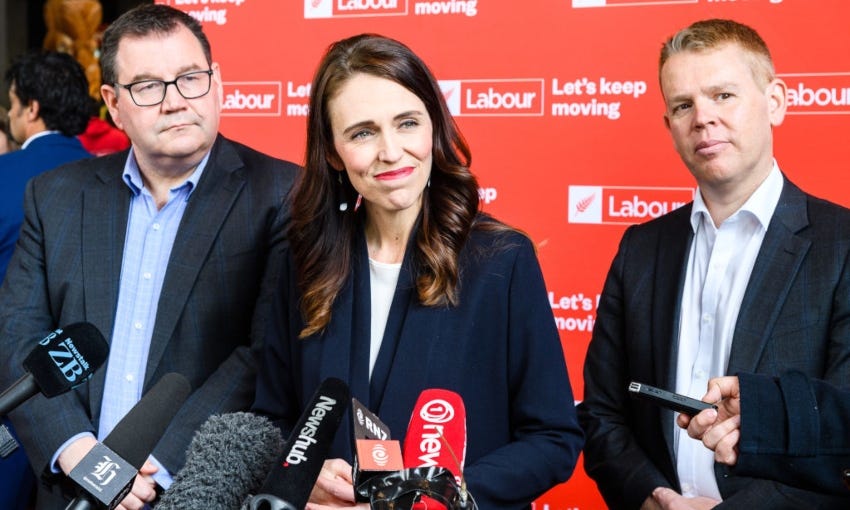Shock and anger at public sector pay freeze
The government has sprung a surprise with the announcement, and the unions are furious
Good morning and welcome to The Bulletin for Thursday 6 May, by Alex Braae for The Spinoff. Presented in partnership with Z Energy.
In today’s edition: Shock and anger at public sector pay freeze, Ardern reprimands but doesn’t sack speaker Mallard, and unemployment rate stays persistently low.
Image: Grant Robertson, Jacinda Ardern and Chris Hipkins on the campaign trail (Getty Images)
It's not often governments make the decisions that are genuinely surprising to observers, but what happened yesterday might come close. Finance minister Grant Robertson told the public service that in many cases, they will not get any pay rises for three years, and for those earning more than 60k a year, raises will only be offered in "exceptional circumstances". It is being justified on the grounds of fiscal prudence. As our political editor Justin Giovannetti reports in the live updates (9.25am) the statement opened with a voluminous statement of thanks to those same public servants for getting the country through Covid. Thanks indeed, you might say.
Some public servants will avoid the pay freeze. The NZ Herald reports about a quarter of those employed in the public sector are on less than 60k a year at the moment, and raises will be targeted towards them. But as a point that illustrates where this will kick in, many categories of border workers are on slightly more than that. For clarity, the decision applies far more widely than just to those who work in offices on Lambton Quay in Wellington.
Other political parties quickly came out against the pay freeze. National's Mark Mitchell cast it as a case of the government allowing "the number of Wellington bureaucrats to swell up to an unsustainable size". And the Green MP Jan Logie said it was morally wrong that "the Government is choosing to ignore our essential workers by suppressing their wages, all for the sake of the bottom line."
And it's quite possible the Public Service Association is the angriest it has been towards the Labour Party in literally decades. In a warning shot of a press statement, PSA National Secretary Erin Polaczuk said it is neither sensible nor acceptable to punish today’s public servants along the way. We expect better from this government. We do not expect our members will quietly accept pay restrictions in perpetuity." With about 20,000 PSA members involved in collective bargaining over the coming year, expect that process to be more fractious than it otherwise would have been. Angry statements were also released by the Police Association, and the Association of Salaried Medical Specialists. The latter point about health workers was picked up more widely in this Radio NZ story, with suggestions people in desperately needed professions will up sticks and go to Australia.
There's a lot of ways this could go politically. Some will of course be happy to see a marginally smaller wage bill being put on the taxpayer. But bigger picture, it seems likely to be self-defeating for the government. High workforce churn and job-switching looms for the sector, right at a time when the government is trying to drive through big, transformative projects. For those public servants working in Wellington, the costs of living will keep going through the roof while their pay falls further behind. On a more intangible level, you've got to wonder what this will do to workplace morale, and the willingness to go above and beyond if another great crisis hits.
And it may well be that the government has simply misjudged how warmly people feel towards public servants. A fascinating Colmar Brunton survey released just yesterday found that steady increases in public trust and respect for the public service are continuing and solidifying.
To close out this bit, I know more than a few public servants and public sector workers read this publication. So I want to know what you think about this. Is it a sacrifice that you're willing to make? Will you stay in the job you're currently in or be more likely to leave as a result? Do you feel valued? Email me at thebulletin@thespinoff.co.nz – bonus points will apply if you send it from your work address.
PM Ardern has reprimanded, but not sacked speaker Trevor Mallard for his statements in parliament on Tuesday night. Our live updates included the full text of her statement, in which Ardern said she "expressed serious concerns to [Mallard] about the manner in which he conducted himself in the house last night. It did not meet the standards I expect. Nor do I consider it to have met the needs of the victim in this situation.” In response, National leader Judith Collins reiterated her call for Mallard to be sacked – her position was covered in detail during yesterday's interview with Morning Report. Political editor Justin Giovannetti has covered both the events of Tuesday night, and followed the story all the way back to where it started.
There are three other pieces I'd recommend you read.Newsroom's political editor Jo Moir reveals that senior figures in the government attempted to keep Mallard calm before his speech in parliament, but he exploded with anger anyway. NZ Herald (paywalled) political editor is deeply and rightly unimpressed by the whole spectacle, laying blame generously. And Stuff's Henry Cooke writes that the episode shows both why people hate politicians, and why women stay silent rather than bringing complaints forward.
The unemployment rate has once again stayed persistently low, confounding pessimistic expectations. Interest reports it dropped to 4.7% in the March quarter, down from 4.9%. On the downside, the underutilisation rate is up slightly as well, meaning that there are more people out there who'd appreciate more work than they're currently getting.
Our members' contributions provide jobs and hope to all the journalists, editors, designers, podcasters and freelancers who make The Spinoff every day. If you enjoy what we do and want to help us do more, please donate today.
Parliament has voted unanimously to back a motion referring to the situation in Xinjiang province. But as Newsroom's Sam Sachdeva reports, the wording of that motion was significantly watered down. Both Act and the Greens wanted the word "genocide" included. In the end, the full text was:
“That this House is gravely concerned about the severe human rights abuses taking place against Uyghurs and other ethnic and religious minorities in the Xinjiang Uyghur Autonomous Region, and that it call on the Government to work with the United Nations, international partners, and to work with all relevant instruments of international law to bring these abuses to an end”.
Will there be repercussions from this? It probably won't be a cut and dried, tit for tat response from China if so. But as the NZ Herald's (paywalled) Andrea Fox reports, a round of audits on primary exporters to China has just taken place, and there is "nervousness" in the industry about what the rules and regulations are. It's not beyond the realm of possibility that those in the Chinese government doing said audits will now choose to interpret the regulations much more harshly, to give a hypothetical but plausible example of what might happen next.
New research has found that Hauraki marine reserves aren't significant enough to protect vulnerable crayfish populations, even within the reserve. The NZ Herald reports that cray populations are estimated to have plummeted in the last ten years, declining by more than half within strict 'no-take' areas. The findings have led to calls for protected areas to be significantly expanded.
In world news, a very strong editorial from the Sāmoa Observer, heavily criticising the country's long-time incumbent PM for agitating for a re-run of the election. Their editorial accuses PM Tuilaepa of being a fake democrat, and "staining" the country's democratic legacy to preserve his own power. "In refusing to accept the potential of defeat and seeking a second try at winning office, Tuilaepa has perpetrated incalculable damage to this nation’s reputation and its institution."
Got some feedback about The Bulletin, or anything in the news?
Drop us a line at thebulletin@thespinoff.co.nz
Right now on The Spinoff: Elizabeth Bowyer explains how deep poor treatment of sexual assault victims runs in the court system. Frances Valintine argues that New Zealand needs to do more to support lifelong learning. Steven Freeland writes about whether we should be worried about a big bit of space junk that will be hitting earth soon. Former media exec Hal Crawford analyses the current state of the advertising-supported news industry. Stewart Sowman-Lund compares New Zealand's Covid vaccine ad with the rest of the world's efforts. Nadia Reid tells First about the time she was kicked out of Countdown for busking. And Sam Brooks reassesses the show Popstars, which has started to pick up the right tune.
For a feature today, an excellent long read about the nature of belief, and the growth in conspiracy theories. Writing for NZ Geographic, Hayden Donnell has covered the issue with deep empathy and humanity, exploring both the forces that lead people to conspiracies, and the communities that embrace them. I genuinely believe it's one of the best articles I've ever read on the subject for those reasons. Funnily enough, there's also a photo of me reporting at an anti-lockdown protest hidden away in it. Here's an excerpt:
QAnon’s assertions are false, but they contain echoes of the way Māori have actually been treated, says [writer Tina] Ngata. She points to the 1960s, when Māori children were taken by the government, often just because their parents’ homes were untidy, and placed in state care homes where sexual abuse was rife. “If you’re one of those Māori who’s uplifted out of your home, placed into ‘care’ and then sexually abused by paedophiles, and you know the government knew about this and did nothing, it’s absolutely reasonable for you to believe this is systematic,” she says. “If you’ve been in a system that’s allowed that to happen to you, it’s not that far-fetched at all to believe the paedophile cabal stories promoted by QAnon.”
Herb Christophers, a communications specialist at the Department of Conservation (DOC), says people won’t believe what you say until they have faith in you and your institution. “Sometimes it might be the absolute bloody truth but people don’t want to trust it because you’re perceived to be the people that have not helped in the past,” he says. “That’s why I say you’ve got to solve social problems before you can solve conservation problems.”
In sport, an incredible story about a sting to stop a horse racing drugs cheat. Stuff's Sam Sherwood reports that the cheat was caught out in part because of a hidden camera being planted by investigators, but unusual betting activity also raised red flags. Even if you're not really into the ponies, the story does a really good job of outlining how clandestine doping works in the sport.
That's it for The Bulletin. If you want to support the work we do at The Spinoff, please check out our membership programme.






